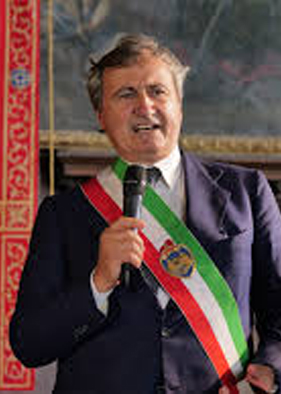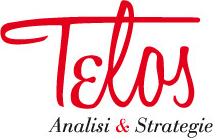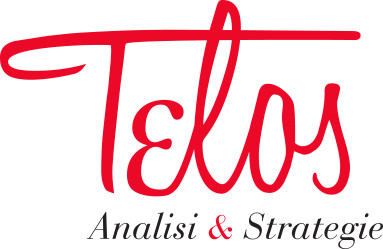December 2019, Year XI, no. 12
Luigi Brugnaro
The Heretical Mayor
"Venice is the paradigm, the gold standard of what Italy could and should be. We can be the role model. An extraordinary heritage with huge potential which struggled to find a path of common sense."
Telos: The crisis of the political parties is probably the origin of the globally spread anti-political sentiment. However, this theory seems to be less true in the relationship between citizens and Mayors. Do you agree?
Luigi Brugnaro: I believe that politics is meant to serve people, to improve their condition. I have never been that interested in political parties as such because their underlying logic, as it is still commonly understood today, is not something I have ever embraced. I’ve never been a politician and I’ve never had a party membership card. To be sure, I’m not against these forms of representation at all: quite the contrary, they have been instrumental in supporting government activities at the local level. But a different principle is my starting point: if someone I’m talking to has a good idea, I don’t care about his/her party affiliation. If I’m dealing with good people, I’m not going to oppose them just because they are not on my political side. Actually valuing people means not giving any weight to what side they’re on. That’s what I’ve always done in my life and that’s what I’m doing right now as an administrator. As a public administrator, my goal is to keep – for matters of my competence – all the promises I made during my electoral campaign by the end of my term and for which I asked and got the trust of the citizens. If this means being labelled as a heretical politician, breaking the mould, being attacked in every way, then it is a badge of honour to me. Their politics is the exact opposite of mine. Instead, my point is that we are still in dire need of harmony for the good of our Italy. My experience in Confindustria taught me to be “pro-government” when it comes to defending the interests of any community which must be helped, in different forms and occasions, regardless of one’s political persuasion. “New” politics prioritises people and personal relationships – trying to engage the many disillusioned voters who no longer go to the polls.
Being elected Mayor of Venice, a city unique in the world, is as much a huge privilege as it is a great responsibility. Would you mind sharing some real-life experiences illustrating this unique character?
This question comes at a particularly critical time for my city as for several days it was hit by exceptionally high water with few precedents in history. The city was on its knees, the tide went over the protective barriers, the Pellestrina island was completely underwater. We suffered extensive, incalculable, catastrophic damage. It is well-known that anything that is soaked in saltwater must be thrown away. The night of 12 November, I saw before my very eyes the tide rising, rising, and rising until it reached 187 cm above zero at Punta della Dogana. I was in Piazza San Marco and throughout the night I wanted to be where my help could be most needed. That night Venice was deeply wounded and that wound left a permanent mark. But perhaps this will help us prevent it from happening again. The whole world has cast its spotlight on our city. We made headlines across the world and we were given the chance to request that the United Nations open an Agency for the study of climate change right here in Venice, where its repercussions are felt most strongly.
And then there’s MOSE. As City Government, we have never been involved in the debate surrounding this issue. Now we have demanded and reiterated, also during the latest 'Comitatone' (Interministerial Committee for the Safeguarding of Venice) meeting in Rome on 26 November, that we must always be informed. On 2 December, MOSE ran its general test. All of its 19 gates at the mouth of the Porto di Malamocco harbour were raised. I wanted to be there and witness with my own eyes how crucial this infrastructure is to protect Venice from high water, to call out loud for it to be put into operation as quickly as possible. MOSE is a one-of-a-kind infrastructure project, our scientific and technologic pride. We must complete it and get it going. It will be one more symbol of the resilience of our city.
This is your first experience as city administrator and being a Mayor is certainly not easy. Are there any obstacles that you didn’t expect and any things that positively impressed you?
Yes, it’s true, I have a different background. I’ve had a political and private life with plenty of nuances. I’m an entrepreneur, a business executive, a sports manager. But at a certain point it became clear to me that I could no longer look the other way. Venezia had been placed under special administration and it was high time to turn things around. This is why in 2015 I decided to run for Mayor. I’ve been doing it for free since then. Sometimes I think that I should pay for the honour of holding this office. My term is almost over now, so I know what I’m talking about. I expected bureaucracy to be intricate, time-consuming, and complex, but reality has exceeded my wildest imagination. This wasn’t enough to discourage me, though. Quite the contrary, in fact. Over these past few years we have improved the efficiency of the administration and many things proceed much more quickly. What is more, we governed lowering debt. Suffice it to say that from 2015 the city’s consolidated debt went from €800 million to €720 million. And if Venice can do it, why shouldn’t Italy, too? What positively impressed me? At the beginning of my mandate, the city felt resigned. But we succeeded in shaking it up and making it a national and global culture, trade, and relations hub again. This has always been Serenissima’s history. A ‘Stato da Màr e Stato da Tera’ (Sea State and Land State) capable of extending its influence everywhere. All we needed to do was to rediscover our pride to reassert this role. Today Venice and Venetians are thinking about the future and are a positive example for the whole world once again. And I can’t but be proud to represent them and, if they want to, to keep representing them in the next five years. Obviously still donating the entirety of my compensation to initiatives of social nature.
Your vision for the future seems to encompass an even more metropolitan territory arguing that ”if Venice can make a new start, Italy will make a new start”. What should be the priorities for our Country today?
Venice is the paradigm, the gold standard of what Italy could and should be. We can be the role model. An extraordinary heritage with huge potential which struggled to find a path of common sense. You can call me a wishful thinker, but I know for a fact that we must make this city shine. We must do it for those who will come after us. We must be proud as Venetians. I know for sure that this city will become a model. I am certain of it because all the conditions are in place for it to happen. Since day one I have focused my efforts on security, even if it meant being called ”sheriff Mayor”. I didn’t care. This is what my conscience told me because I firmly believe that only safe people can be free. Freedom is the result of security and public order. Only this way can we improve the city’s standard of living and ability to attract investments and skilled labour. Other key priorities are institutional reforms, employment as a value, industrial development, and the defence of our freedoms. We must do it with conviction. Italy must believe in itself. We must think of the younger generations and build what they will need. I’m an optimist by nature and I believe that hard work, dedication, and putting yourself out there pays off at the end of the day. And I’m sure that our talented young people can win this game. It is incumbent upon us not to disappoint them. We must lead by example and show them that the best, the most deserving, and the most tenacious can do it. And that anyone can find the field where he/she can excel as long as he/she does its best.
Marco Sonsini
Editorial
PRIMOPIANOSCALAc’s 2019 #MayorSeries closes with an interview to Luigi Brugnaro, the Mayor of Venice. And what better time to read in the Mayor’s words the strength and the determination necessary to bounce back from the latest flood which tragically wounded the city last November? But there’s a way to turn this unfortunate event into a fresh start. During the flood, the Mayor has put in almost superhuman work and commitment: he even took on the mantle of first responder in a completely flooded Piazza San Marco and together with police officers rescued a camera operator stuck on a boardwalk due to his unsuitable boots. Brugnaro, who was supposed to give an interview with the camera crew, didn’t think twice! He reached the camera operator wearing high boots and led him arm in arm to a shallower area below the Procuratie Nuove.
Taking stock of his 5-year term, Brugnaro stresses his indifference to party politics and reaffirms his openness to a dialogue focused on ideas, regardless of party allegiance he has never pledged. This disavowal is mirrored by polls on public trust in political parties which since 2017 has been steadily below 15%. In light of these numbers, historian and sociologist Marc Lazar underscored the need to rebuild a trust-based relationship between decisionmakers and the population – a relationship requiring refounded, rethought, renewed parties, as well as a competent and transparent political class in constant dialogue with society.
After all, nowadays political education is not necessarily provided exclusively by parties. Many of us have discovered their passion for politics and cultivated their interest in the common good in their professional careers, in the world of associations, or in the voluntary sector. Citizens’ initiatives represent a valuable heritage, but they’re not enough on their own. Political parties remain necessary to build any viable political perspective based on concrete action capable of having a tangible impact on people’s life. The case of the citizens of Venice (and Mestre) supports this argument. They are vehemently passionate about key issues for the future of their city, but almost uninterested in matters of principle. Just to give you an idea, voter turnout in the consultative referendum on the separation of Venice and Mestre was only 21.73%. This is a relevant example since it was the fifth consultation on this issue, allowing for a comparison based on actual numbers. 214,000 citizens took part in the first vote in 1979, 204,000 in 1989, 182,000 in 1994, 93,000 in 2003, and 45,000 the last time. To be sure, over the years the population dropped both in the historical centre and on the mainland, but such a low turnout should make us think. But when it comes to tourism, security, the protection of the city and its lagoon, housing, commerce or education, Venetians are all fired up and make themselves heard.
The symbol we chose for our cover dedicated to Venice is the magical art of glass blowing, two red and golden stemmed glasses, fragile and wonderful like the fairy-tale Lagoon City. The two precious art objects are accompanied by a quotation by Goethe dedicated to Venice in his ‘Italian Journey’, written in November 1786 while in Rome: ‘I look back with special joy to Venice, that great being who sprang from the sea like Pallas from the head of Jupiter’. With this December issue, all of us at Telos A&S wish you a Merry Christmas and a Happy 2020.
Mariella Palazzolo

Luigi Brugnaro was elected Mayor of Venice on 14 June 2015. He ran as the leader of the centre-right coalition and won 53.21% of the vote, defeating Felice Casson, the centre-left candidate.
Before being elected, he was the President of Umana, a holding company bringing together 20 businesses operating in services, manufacturing, construction, sports, and agriculture. From 2009 to 2013, he served as the President of Confindustria Venezia, ‘reclaiming an active role in the public debate on the future of our economic and social system’.
He also chaired Assolavoro, the national association of employment agencies, was a member of the National Council and National Board of Confindustria, was Veneto Region’s delegate at Expo 2015, and served as the President of the Veneto Expo Committee.
Born in 1961 in Mirano, a town in the Metropolitan City of Venice, to Maria, a primary school teacher, and Ferruccio Brugnaro, a poet, worker, and trade union leader at the Montefibre plant in Porto Marghera, he graduated with honours in Architecture from Iuav in Venice. He’s a basketball enthusiast. In 2006, he took over Reyer, the historic Venice basketball team founded in 1872 and the only club whose both men’s and women’s teams are currently playing in the top league. A sport project, as well as a social and cultural initiative across the city involving over 4,500 athletes from 23 clubs in its youth division. In 2014, he was awarded the Premio Reverberi, a basketball Academy Award of sorts “for his contribution to Italian basketball”.
Luigi Brugnaro has 5 children: Valentina, Andrea, Piera Maria, Jacopo, and Ettore. His longtime partner is Stefania Moretti.
He is very active on social media, for instance on Instagram, where he posts frequent updates on his daily life.
Marco Sonsini







SocialTelos